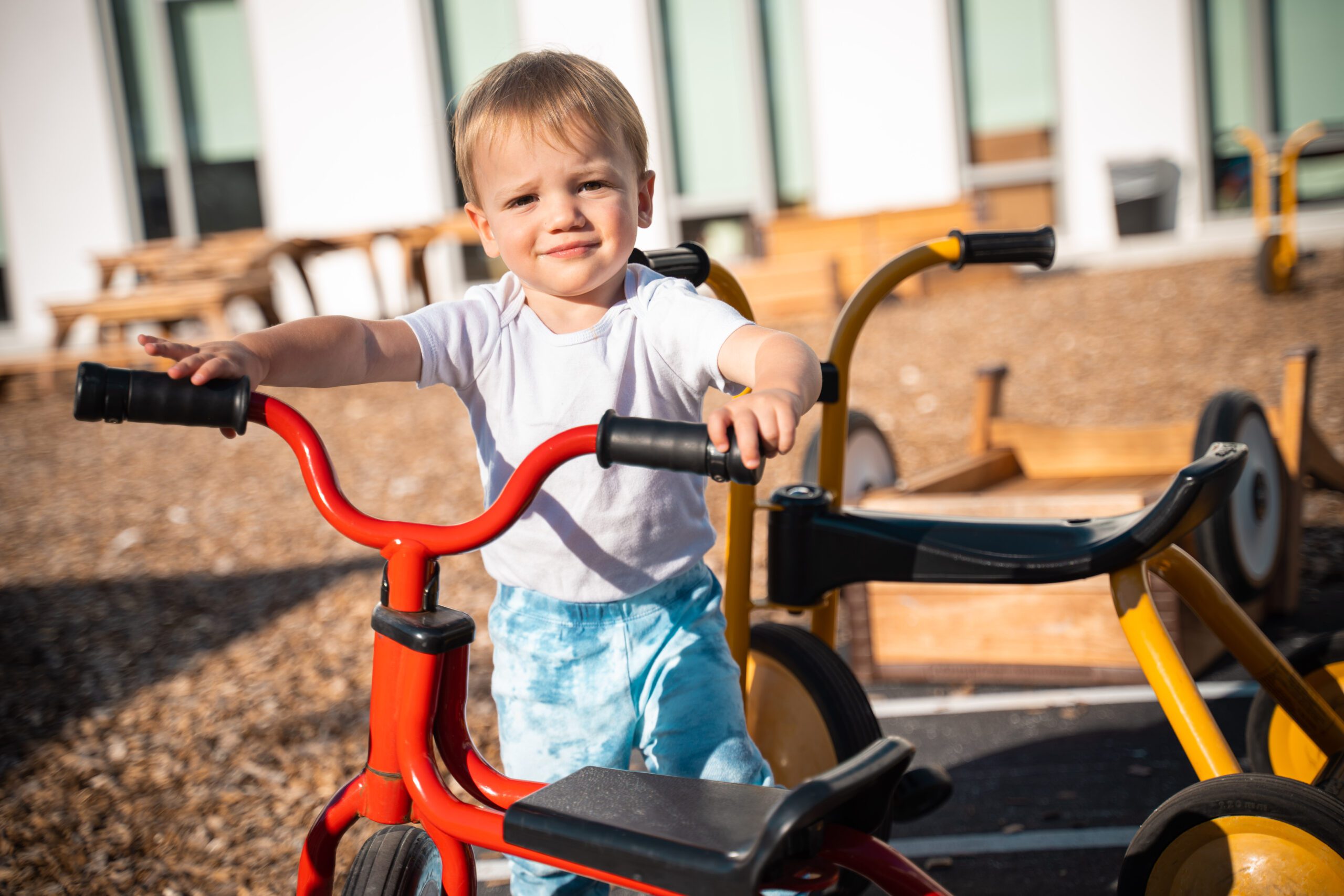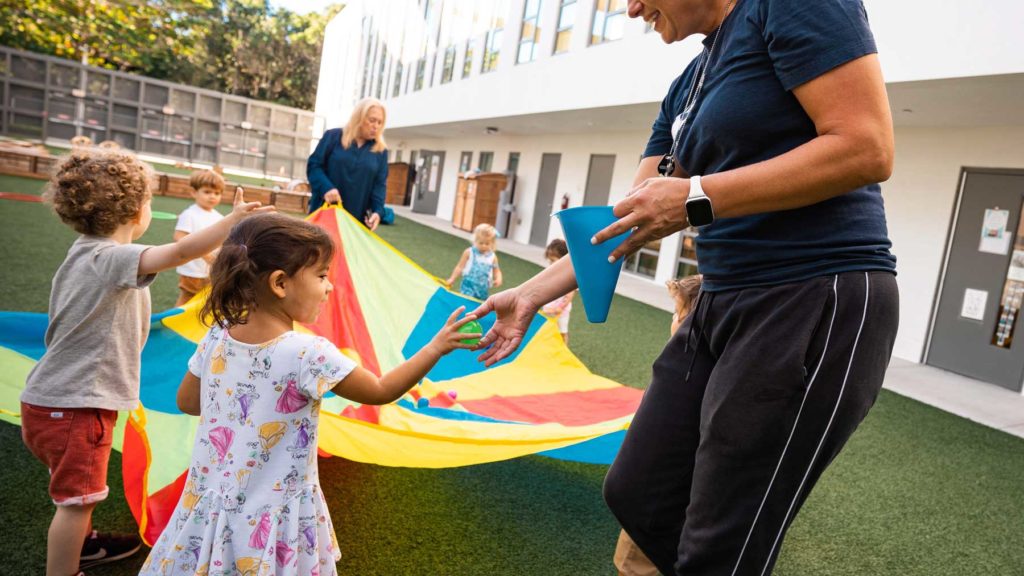Educational Philosophy for
Early Childhood (18-Months through 4s)
In the Early Childhood Program at Rambam Day School Temple Beth Am, we foster development through a child-centered approach where all children are known, seen, valued, and loved. We engage children daily in deep and meaningful project work, real-world explorations, and by coming together as a Jewish community as we lay the foundation of lifelong values and tradition.
Through developmentally appropriate practices, we take a whole child approach where we emphasize social and emotional learning and 21st-century skills as much as we value pre-reading and early mathematical skills. In Early Childhood, we celebrate each family’s diverse background and unique customs, and we often look to families to help us build strong home-to-school connections. We offer a safe, caring, and nurturing environment for our students.
The Early Childhood Program at Rambam Day School is play-based and project-based. We recognize the value of play as a central component of children’s learning and development. Through play, we listen to their ideas, interests, and opinions and build curriculum based on the children’s interests within the classroom.
The Reggio Emilia Approach:
- Image of Child: We view children as competent and capable individuals with rights, potential, and the ability to construct their own knowledge.
- Environment: We consider the learning environment to be the “third teacher.” We intentionally prepare our classrooms to be welcoming, aesthetically pleasing, and filled with open-ended materials that provoke exploration, creativity, and problem-solving.
- Home-to-School Connections: We view parents as partners in their children’s education, and we encourage their involvement.
- Curriculum: We base our curriculum on the interests and questions of the children.
- Documentation: We use documentation to tell the story of the learning that is taking place. Teachers document the learning and use the documentation to reflect on classroom experiences with the children. Teachers display the documentation in the classrooms and hallways and share it with families via Google Classroom.
- Teachers as Facilitators and Researchers: Teachers act as facilitators, observing and documenting children’s interests and experiences and using that information to plan engaging learning opportunities.
Age Group Descriptions
Our 18-month-olds embark on a journey with materials where they establish a foundation for lifelong learning. Children in this age group are busy and in constant motion. Offering thoughtful, interesting, and beautifully prepared materials gives the 18-month-olds an opportunity to explore and learn by doing. The scaffold of materials starts with the most familiar, and, over time, they learn how to combine materials to go deeper with their thinking and understanding of them. Our 18-month-olds are rapidly learning how to navigate the world outside their home and build trust with new adults, peers, and environments. To support them, we offer a warm and welcoming environment that keeps them engaged and enriches their mind and bodies through daily outdoor play and weekly music, makerspace, and Shabbat experiences. The 18-month program consists of both full and half-day options.
The world of the 2s is rich with discovery, where each moment is full of wonder and no curiosity goes without further exploration. Though small, they are mighty. Children in the 2s have big ideas, big emotions, and a vast capability of learning through play, interactions, and experimentation. Children in the 2s engage with a variety of classroom materials where they construct an understanding of the world around them and build theories on how the world works. Teachers observe and document their play and words, which then inspire interdisciplinary classroom projects spanning several weeks. These projects encompass language, literacy, mathematics, science, social and emotional learning, and more. Children in the 2s play outdoors daily and participate in music, makerspace, and Shabbat experiences weekly. The 2s program consists of both full and half-day options.
The year of the 3s is transformative as these young learners move from toddlerhood to early childhood. It is here that we witness much growth in language, development, and autonomy. The 3s are curious, constantly asking questions and working to find the answers through play, hands-on explorations, and project work. They embark on complex play scenarios that weave their understanding of relationships, favorite stories and plots, and their developing understanding of the world. Our goal in the 3s is to give room for play, to invite children into purposeful projects that stem from the children’s ideas and curiosities, and to give them space to wonder, create, solve problems, collaborate, and go deeper with their understanding of themselves and those around them. Children in the 3s play outdoors daily and participate in music, physical education, makerspace, and Shabbat experiences weekly.
The 4s program is bursting at the seams with excitement. This is the year when everything comes together to allow for deeper and more meaningful explorations, projects, and relationships. Children in the 4s are more independent and begin taking ownership of daily routines and rituals within the classroom. Our 4s students learn through project-based learning, the topics for which are built upon the teachers’ observations of the children’s play and areas of interest. We design projects to be interdisciplinary in approach, exposing the 4s authentically to math, literacy, language, history, science, and social and emotional learning. Project-based learning invites children to solve real-world problems, think outside the box, and collaborate daily. At this age, children have a more established understanding of themselves and those around them, which leads to more complex play, conversation, and the ability to navigate social relationships. Classroom teachers on this level construct daily experiences that are intentional, developmentally appropriate, and afford children the opportunity to work in large groups, small groups, and independently. Children in the 4s play outdoors daily and participate in music, makerspace, and Shabbat experiences weekly. This level takes occasional field trips that are specifically related to projects within the class.

3 Year Olds
Sample Schedule
8:45 – 9:20 AM: Soft entry and Morning Meeting
9:25 – 10:45 AM: Classroom time and snack
10:50-11:20 AM: Co-curricular (Music, Makerspace)
11:25 AM – 12:00 PM: Outdoor play
12:05 – 12:35 PM: Lunch in the classroom
12:45 – 1:15 PM: Rest (if children fall asleep, a full nap will be offered)
1:15 – 2:30 PM: Afternoon activities (PE, outdoor play, classroom activities)
2:30 – 2:45 PM: Story and Closing Meeting
2:45-3:05 Early Childhood Dismissal
Accreditation and Licensing
The Early Childhood program adheres to guidelines established by the National Association for the Education of Young Children (NAEYC). This prestigious national organization in early childhood learning provides information linking educational practices to current educational research. Having achieved NAEYC accreditation and the Florida Gold Seal of Excellence, our curriculum and classrooms reflect these developmentally appropriate guidelines. Approximately 7% of the nation’s early childhood programs maintain this designation. Rambam Day Schools’ Early Childhood program is also licensed by the Florida Department of Children and Families: C11MD055
